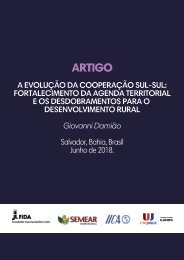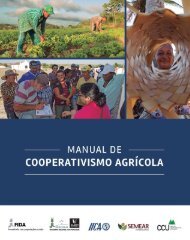The Evolution of South-South Cooperation
Since the Bandung Conference in 1955, the countries of the South have organized themselves in a structured way to achieve better levels of development. This article aims to present the evolution and recent trends of South-South Cooperation, showing how the historical dynamics have led the United Nations and its agencies to adopt a territorial approach, with a strong appeal to mobilize local actors. Allied to this, the increase of the independence of the actors that, with autonomy, manage to dialogue and conduct initiatives of cooperation outside the formal sphere of the central government. This article also aims to present rural development, agriculture and food security as essential factors for the development that since 1978, with BAPA (Buenos Aires Plan of Action), is one of the main thematic lines presented when it comes to the development of the southern agenda. Alongside this, the challenges presented by the prioritization of market dynamics in the face of social development, and how some of the multilateral agencies have worked to promote the facilitation of South-South cooperation and empowerment of minorities, in the achievement of governance as a strategy for endogenous and localized development
Since the Bandung Conference in 1955, the countries of the South have organized themselves in a structured way to achieve better levels of development. This article aims to present the evolution and recent trends of South-South Cooperation, showing how the historical dynamics have led the United Nations and its agencies to adopt a territorial approach, with a strong appeal to mobilize local actors.
Allied to this, the increase of the independence of the actors that, with autonomy, manage to dialogue and conduct initiatives of cooperation outside the formal sphere of the central government. This article also aims to present rural development, agriculture and food security as essential factors for the development that since 1978, with BAPA (Buenos Aires Plan of Action), is one of the main thematic lines presented when it comes to the development of the southern agenda. Alongside this, the challenges presented by the prioritization of market dynamics in the face of social development, and how some of the multilateral agencies have worked to promote the facilitation of South-South cooperation and empowerment of minorities, in the achievement of governance as a strategy for endogenous and localized development
You also want an ePaper? Increase the reach of your titles
YUMPU automatically turns print PDFs into web optimized ePapers that Google loves.
Neoliberalism, established internationally as macroeconomic policy in 1989 during the<br />
Washington consensus, was intended to promote economic growth and the reversal <strong>of</strong> the high<br />
levels <strong>of</strong> debt, deficit and economic instability <strong>of</strong> the States (AYERBE, 2002). In the short term this<br />
model managed to balance the balance <strong>of</strong> payments <strong>of</strong> many countries, but did not generate<br />
material effects in terms <strong>of</strong> social development. On the contrary, the 1990s was characterized by<br />
the rise in underdevelopment in countries <strong>of</strong> the <strong>South</strong>. In Africa, some States still underwent<br />
struggles for independence and civil wars, as in the case <strong>of</strong> Rwanda (as in the apex <strong>of</strong> the genocide<br />
in 1994) and Angola (with extension <strong>of</strong> the Civil war until 2002), both with overt armed conflict that<br />
inhibited any sort <strong>of</strong> action directed to ensuring the protection <strong>of</strong> the basic needs <strong>of</strong> the population.<br />
Latin America suffered the consequences from the massive adoption <strong>of</strong> the ideology <strong>of</strong><br />
neoliberalism. According to Brieger (apud. BOLTVINIK, 2002), between 1994 and 1996 in Mexico<br />
the percentage <strong>of</strong> extremely poor people greatly increased from 40% to 55% <strong>of</strong> the population; in<br />
1989 there were 79 million Mexicans, <strong>of</strong> which 55.9 million were poor, whereas in 1999 the<br />
population was about 100 million people, <strong>of</strong> which 73 million were poor (BRIEGER apud. BOLTNIVIK,<br />
2002). Mexico's case exemplifies very well a pattern that was repeated in Latin America as a whole,<br />
and that was crucial to rethink the sustainability <strong>of</strong> economic gains in disassociation with<br />
development, and its respective impact on society.<br />
<strong>The</strong> new guidelines <strong>of</strong> the TCDC, proposed by the 1995 document, did not have the<br />
expected effect. <strong>The</strong> sense <strong>of</strong> autonomy and empowerment <strong>of</strong> society was relegated to the<br />
background in relation to the facilitation <strong>of</strong> the action <strong>of</strong> the market. In the 1990s, many <strong>of</strong> the<br />
regional integration initiatives in the Third World – MERCOSUR, ASEAN, etc. – sought to promote the<br />
association <strong>of</strong> the States to strengthen the intraregional market and prepare it to dialogue with the<br />
overt dynamics <strong>of</strong> international trade, model known as open regionalism (SOUZA SILVA; COSTA,<br />
2013).<br />
<strong>The</strong> main differences between the "North" and "<strong>South</strong>" are underpinned by the logic <strong>of</strong> the<br />
International Division <strong>of</strong> Labor, which determines, from the perspective <strong>of</strong> Northern States, the<br />
southern axis as producer <strong>of</strong> primary inputs, with very low added value, such as agricultural<br />
commodities, and extremely cheap workforce, always hostage <strong>of</strong> market fluctuations and <strong>of</strong> the<br />
deterioration <strong>of</strong> the terms <strong>of</strong> trade. <strong>The</strong>se ideas were already part <strong>of</strong> the studies <strong>of</strong> the Economic<br />
Commission for Latin America and the Caribbean (ECLAC) since the 1950s, and were basic<br />
09




